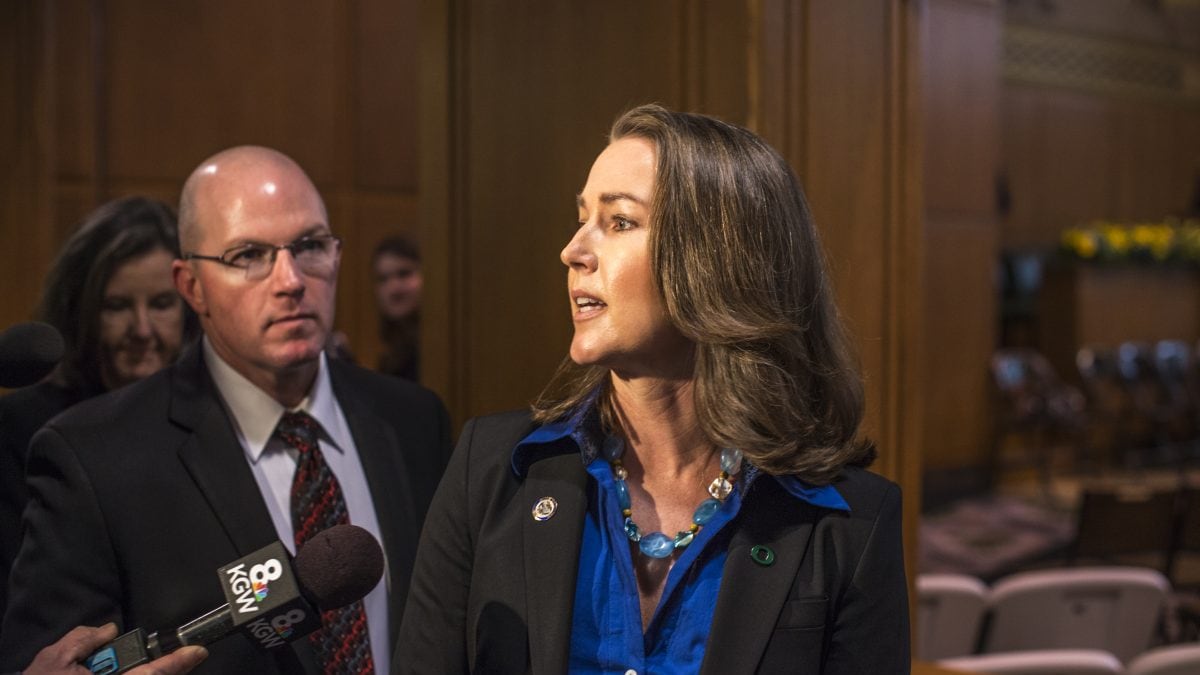The Oregon Government Ethics Commission reacted strongly today to the presentation of a lengthy investigation into the tangled business dealings of former Oregon first lady, Cylvia Hayes.
The eight-member commission voted on a preliminary finding that Hayes committed 22 separate violations of state ethics laws that prohibit a public official from using her position for private gain, engaging in conflicts of interest, and improperly accepting gifts.
"Ms. Hayes ignored the ethics laws of this state for years," said Commissioner Nathan Sosa. "She chose not to be here today to be held accountable. She needs to be held accountable now."
The Ethics Commission was considering Hayes' case after a long hiatus. During that time, state and federal officials conducted criminal investigations of influence-peddling allegations against Hayes and former Gov. John Kitzhaber.
Those allegations were first reported by WW in the fall of 2014.
When those investigations ended with no charges filed last year, the commission resumed its investigation of a complaint originally lodged in 2014 by former State Rep. Vicki Berger (R-Salem).
After hearing a presentation from ethics investigator Marie Scheffers, commission members voted to uphold all but one of the 23 ethics law violations Scheffers found. (The potential violated commissioners rejected involved Hayes' use of the Oregon State Police Dignitary Protection Unit, which provides security to the governor and family members.)
Commissioner Dave Fiskum, a longtime Salem lobbyist, pushed for the maximum fine, because Hayes and Kitzhaber were sophisticated figures who operated at the highest levels of state government.
"The gravity of the circumstances underscores the need for the maximum penalty allowed under law," Fiskum said. "If that's $110,000 [$5,000 per violation], that's where I am."
Commission chair Alison Kean suggested the commission could go even further. Kean noted that state law allows the Ethics Commission to seek the forfeiture of money earned from improper contracts—and in some cases, double the amount earned.
Hayes took in more than $200,000 from a fellowship and at least three consulting contracts between 2011 and 2013.
The underlying ethics issue is that those contracts often overlapped with the policy areas on which she served as an official policy advisor to Kitzhaber, as first detailed in a 2014 WW cover story.
The Ethics Commission investigation found, and commissioners agreed, that Hayes only received the fellowship and the contracts by dint of her public position as first lady and advisor to the governor.
"What we saw is a complete blending of private, paid work with a government official's public work," Kean said. "I was very, very disappointed to see in the report the complete lack of a bright line between private business and the and the business of the public."
The commission's response to the Hayes investigation will affect its handling of similar complaints against Kitzhaber.
Originally, commission staff had agreed in November to settle complaints of failing to disclose conflicts of interest against Kitzhaber for a $1,000 fine. The commission rejected that proposed settlement and will again consider resolution of his case in February.
Kean made it clear today that the commission will look at Kitzhaber differently in light of the findings against Hayes.
"I think it's also a very clear case about the member of her household who also benefited from her contracts—and that's [Kitzhaber]," Kean said. "Much of what happened here—because they share a household—is applicable to the governor."
The Ethics Commission has thus decided two points of contention.
First, it has ruled that because Hayes made policy, advised the governor, directed public employees and attended high level staff meetings, she was a public official in Kitzhaber's administration and subject to state ethics laws.
Second, Kean's description of the financial relationship between Hayes' contracts and Kitzhaber—he benefited because they shared a common household—also clarifies a point of dispute. Although Kitzhaber had earlier filled out state financial disclosure forms listing Hayes as a member of his household, he backed away from that position at a 2015 press conference shortly before he resigned.
Ethics Commission staff will now communicate to Hayes today's findings and seek her response. She has the option to dispute the 22 violations in a contested case hearing, suggest a settlement, or wait for the commission to officially decide on a fine at its February meeting. That's when the commission will also resolve Kitzhaber's case.
Kean urged her colleagues and commission staff to also hold the former governor accountable for Hayes actions.
"The responsibility for this abuse of position and abuse of office is shared by the governor," Kean said. "She wasn't elected. He was. He was paid a large amount to be governor and he was the vehicle by which she was able to profit."
